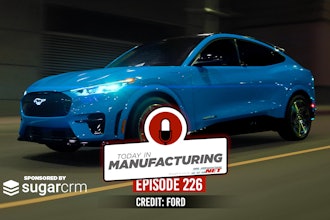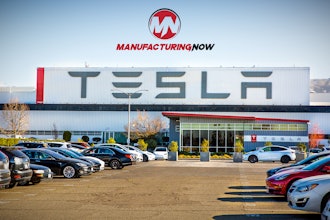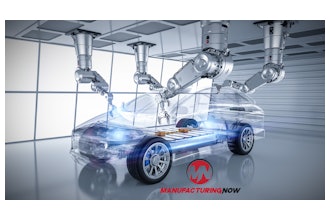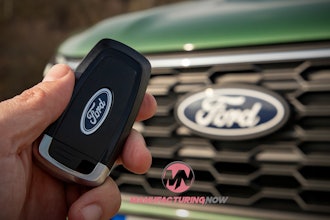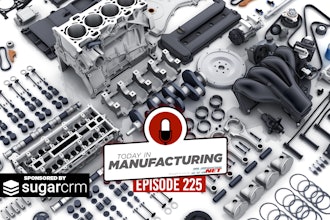Many automakers have been shifting toward touchscreens embedded in their vehicles’ dashboards and away from dedicated physical buttons. While it may enable more potential features, it could also make driving less safe and possibly more annoying. But one company makes it sound like touchscreens are here to stay, at least until the industry moves onto the new thing.
Wassym Bensaid, chief software officer at EV maker Rivian, spoke this week at TechCrunch Disrupt 2024 and addressed in-vehicle buttons, calling them an “anomaly.”
“It’s a bug. It’s not a feature,” he told the crowd. “Ideally, you would want to interact with your car through voice. The problem today is that most voice assistants are just broken.”
Most Read on IEN:
It’s true that many automakers including Rivian have been working to optimize voice controls for vehicles and haven’t yet gotten to the point where it works. Bensaid said the key may be AI, which could help your car understand the confusing requests a driver might yell out while driving. It could also help surface more potential features that may be buried by the menus in a traditional user interface.
The problem is an AI voice assistant in the car is still a long way from being successfully implemented. And in the meantime, a lot of drivers are still interacting with touchscreen infotainment systems that can be seriously distracting. A 2019 study from the AAA Foundation found that infotainment systems can distract drivers, especially drivers aged 55 to 75, for up to 40 seconds. As David Zipper, a senior fellow at the MIT Mobility Initiative, pointed out, that’s enough time for a vehicle traveling 50 miles per hour to cover half a mile.
If using a smartphone while driving is frowned upon, it stands to reason that essentially using a tablet stuck to the dash would be, too. But, despite the cost and design engineering benefits of installing a touchscreen instead of accommodating a bunch of buttons and dials, some automakers like Hyundai and Volkswagen are still embracing tactile controls.
Click here to subscribe to our daily newsletter featuring breaking manufacturing industry news.
WEBVTT
X-TIMESTAMP-MAP=LOCAL:00:00:00.000,MPEGTS:0
00:00.070 --> 00:04.070
Many automakers have been shifting toward
touchscreens embedded in their vehicles,
00:04.079 --> 00:07.380
dashboards and away from dedicated physical
buttons.
00:07.480 --> 00:13.060
While it may enable more potential features, it
could also make driving less safe and possibly
00:13.069 --> 00:16.030
more annoying.
But one company makes it sound like touch
00:16.040 --> 00:19.899
screens are here to stay at least until the
industry moves on to the new thing.
00:20.049 --> 00:25.700
Wasem Ben said chief software officer at EV
Maker Rivian spoke this week at techcrunch
00:25.729 --> 00:31.459
disrupt 2024 and addressed in vehicle buttons
calling them quote an anomaly.
00:31.469 --> 00:34.680
It's a bug not a feature.
He told the crowd ideally,
00:34.689 --> 00:37.290
you would want to interact with your car
through voice.
00:37.349 --> 00:40.880
The problem today is that most voice assistants
are just broken.
00:40.955 --> 00:45.784
It's true that many automakers including Rivian
have been working to optimize voice controls
00:45.794 --> 00:49.334
for vehicles and haven't yet gotten to the
point where it works.
00:49.345 --> 00:54.915
Ben said said the key may be A I which could
help your car understand the confusing request.
00:54.924 --> 00:59.944
A driver might yell out while driving, it could
also help surface more potential features that
00:59.955 --> 01:03.854
may be buried by the menus in a traditional
user interface.
01:03.865 --> 01:09.360
The problem is an A I voice assistant in the
car is still a long way from being successfully
01:09.370 --> 01:12.449
implemented.
And in the meantime, a lot of drivers are still
01:12.459 --> 01:17.360
interacting with touchscreen infotainment
systems that can be seriously distracting a
01:17.389 --> 01:23.309
2019 study from the AAA Foundation found that
infotainment systems can distract drivers,
01:23.319 --> 01:27.959
especially drivers aged 55 to 75 for up to 40
seconds.
01:28.000 --> 01:33.900
As David Zipper, a senior fellow at the MIT
mobility initiative pointed out that's enough
01:33.910 --> 01:39.955
time for a vehicle traveling 50 MPH to cover
half a mile if using a smartphone while driving
01:39.964 --> 01:43.095
is frowned upon.
It stands to reason that essentially using a
01:43.105 --> 01:48.205
tablet stuck to the dash would be too.
But despite the cost and design engineering
01:48.214 --> 01:52.995
benefits of installing a touch screen instead
of accommodating a bunch of buttons and dials.
01:53.154 --> 01:58.635
Some automakers like Hyundai and Volkswagen are
still embracing tactile controls.
01:58.754 --> 02:01.044
I'm Ben Munson and this is manufacturing now.








